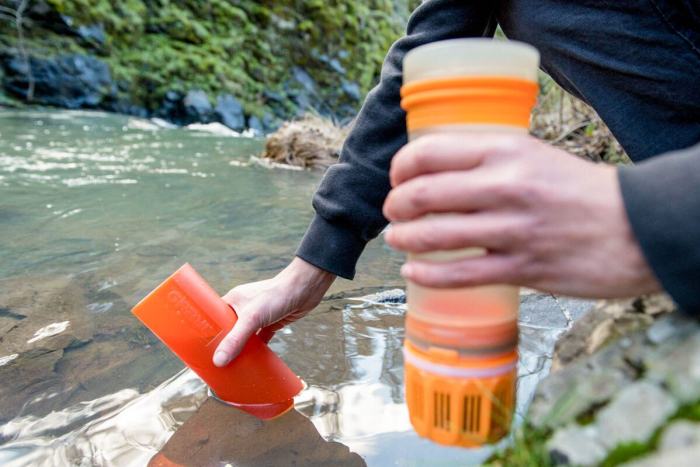Product Description
GRAYL is a portable water purifier bottle that is mostly used for emergency preparedness or outdoor activities including international travel. The filter is able to remove 99.99% of viruses (e.g. Rotavirus, Norovirus, Hepatitis A), 99.9999% of bacteria (e.g. E Coli, Salmonella, Dysentery), and 99.9% of protozoan cysts (e.g. Giardia, Cryptosporidium, Amoebae). It was developed by Nancie Weston and Travis Merrigen. This product is offered in mainly two different types of bottles: Geopress and Ultralight.
Target Users (Target Impact Group)
Distributors / Implementing Organizations
This product is available online at GRAYL's website for purchase.
Manufacturing/Building Method
This product is designed in the United States, filter bottle "Geopress " is mass-manufactured in China and purifier cartridge media is made in the United States.
Intellectural Property Type
Patent Protected
User Provision Model
Users can directly order the product from the company's website.
Distributions to Date Status
Unknown
Type of filter
Ion exchange, ultra-powdered activated carbon,Electroadsorptive media
Primary material of construction
Polypropylene #5, food-grade silicone, TPE, ABS food-grade plastic.
Additives
Unknown
Manufacturer-specified flow rate (L/hr)
5 L/min
Bacteria reduction
99.9999%
Virus reduction
99.99%
Protozoa reduction
99.9%
Heavy metals and/or arsenic reduction
Filters lead, arsenic and chromium.
Maximum recommended influent turbidity level (NTU)
30
Effluent turbidity levels (NTU)
Unknown
Maintenance schedule
None
Manufacturer-specified lifetime volume (L)
250
Safe water storage integration
None
Design Specifications
The product consists of a cartridge technology with a patented electroadsorbative media, ion exchange, and activated carbon. It works in the principle of french press mechanism i.e. filters the water just by applying a normal body weight pressure for about 15 secs. The flow rate of this product is 5L/min and provides a drinking water storage capacity of 24 oz (710 ml).
The bottle's physical design include:
- Weight: 15.9 oz (450 g)
- Height: 10.4" (26.5 cm)
- Diameter (at base): 3.4" (8.6 cm)
This product works on three principal filtration technologies:
- Electro-adsorptive media: made up of triple ion charged mesh that creates a submicron trap (like a magnet) for trapping and removal of pathogens and inorganic compounds (bacteria, protozoan, viruses).
- Ultra-powdered activated carbon: made up of coconut husks that filter toxins, traps heavy metals, and industrial chemicals.
- Ion exchange: made up of silver treated zeolites that inhibit the growth of mold, mildew, and bacteria to keep the purifier fresh between uses.
Technical Support
Provided by the manufacturer.
Replacement Components
Purifier cartridge
Lifecycle
The product has a 10-year warranty with a total filter capacity of 250 L for each cartridge.
Manufacturer Specified Performance Parameters
This filter was designed to reduce pathogens including viruses up to 99.99%, particulates mater like microplastics, sediment, silts, chemicals like chlorine, benzene and chloroform, and heavy metals like lead, arsenic, and chromium.
Vetted Performance Status
Testing performed by Biological Consulting Services of North Florida, Inc determined a 99.999% reduction in parasite contamination and 99.9999% reduction in bacterial and viral contamination.
Safety
No known safety hazards are related to this product. However, users should follow some precautions provided by the company in order to increase the lifespan of the filter cartridge.
Complementary Technical Systems
None
Academic Research and References
Komlenic et al., 2007, Water filtration media: Talking about a revolution?. Filtration & separation, 44(5), 26-29.
Li, H. W et al., 2009, Removal and retention of viral aerosols by a novel alumina nanofiber filter, Journal of Aerosol Science, 40(1), 65-71.
Solodovnichenko et al., 2017, Carbon coated alumina nanofiber membranes for selective ion transport, Advanced Engineering Materials, 19(11), 1700244.
Sobsey, M. D., & Glass, J. S, 1980, Poliovirus concentration from tap water with electropositive adsorbent filters, Appl. Environ. Microbiol., 40(2), 201-210.
Gibbons et al., 2010, Evaluation of positively charged alumina nanofibre cartridge filters for the primary concentration of noroviruses, adenoviruses and male?specific coliphages from seawater, Journal of applied microbiology, 109(2), 635-641.
Ikner et al., 2011, New method using a positively charged microporous filter and ultrafiltration for concentration of viruses from tap water, Appl. Environ. Microbiol., 77(10), 3500-3506.
Compliance with regulations
The product meets the EPA Guide Standard and Protocol for testing microbiological water purifiers which were tested independently by a certified laboratory to meet or exceed NSF protocol 42 and 53 for pathogen and chemical removal.
Other Information
Get more information about Solutions Library and its features.
Learn MoreHave thoughts on how we can improve?
Give Us Feedback